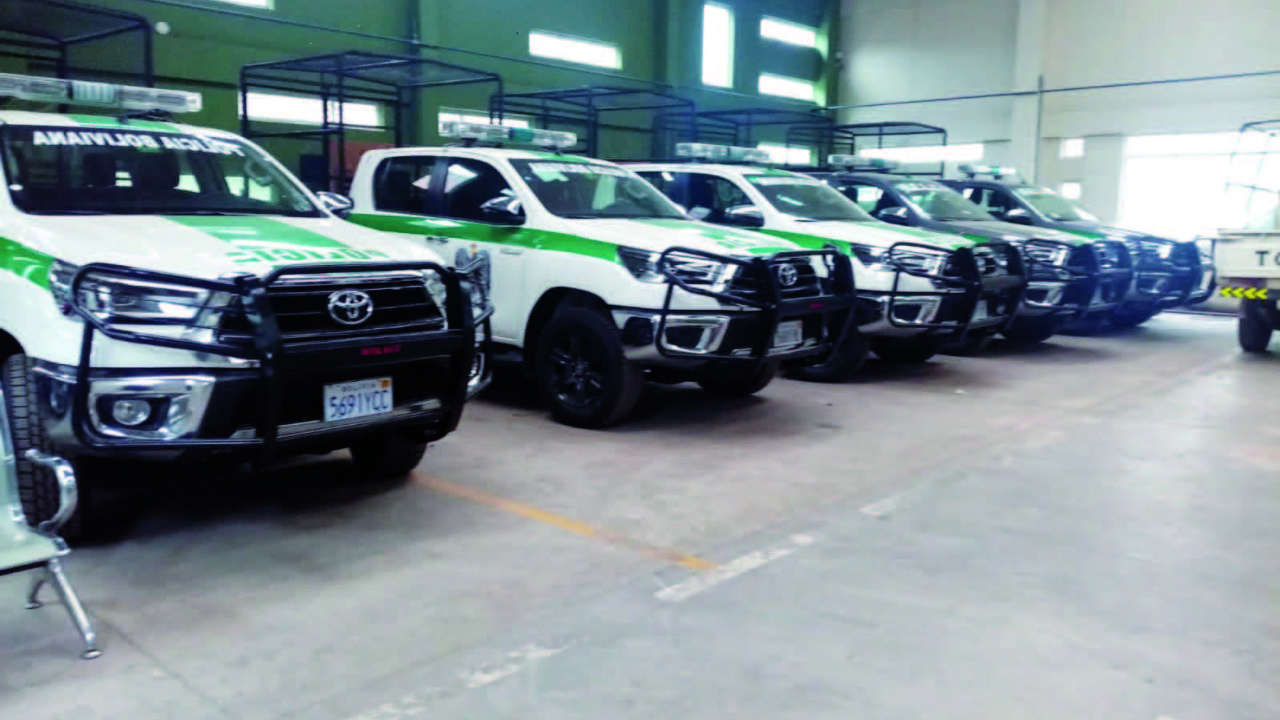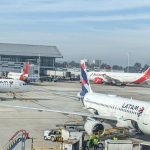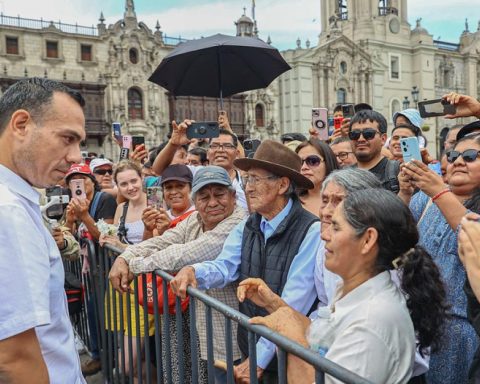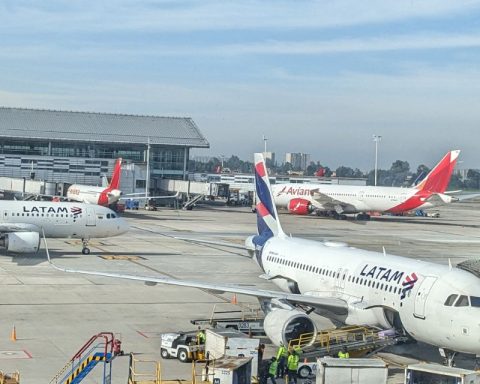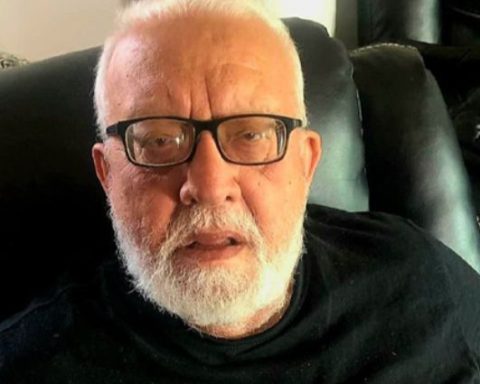Alcides Flores / Page Seven
The five zero kilometer Toyota Hilux trucks that are now in a Potosi Police shed could not legally enter the country because the company admitted them without fulfilling an essential requirement when it comes to zero kilometer vehicles: the manufacturer’s certification, in this case. of the Japanese company Toyota.
However, the company Stefals Logistics was able to skip that requirement: use the Industrial Free Zone, and for that it obtained papers in the Iquique free zone with the label “to recondition”. However, according to the complaints, the workshops that operate in the Industrial Free Zone do not carry out any reconditioning work when it comes to totally new vehicles, so they limit themselves to issuing the certifications, which are endorsed by the National Customs.
Then, what function does the Industrial Free Zone currently fulfill?” Luis Encinas Valenzuela, general manager of the Bolivian Automotive Chamber, was asked. “None. They are not doing anything. They are making certificates. New vehicles arrive all the time. Around 1,000 zero-kilometre vehicles come in each year for reconditioning,” he replied. “They cut a cable and hit it again to show that they have done a reconditioning job,” says Luis Encinas.
If so, the Industrial Free Zone has become the area that opens the doors to a mechanism that allows hitting the coffers of the State. And if so, as Encinas affirms, the Industrial Free Zone causes a loss to the State of more than 20 million dollars annually, due to tax evasion.
The last publicly known dubious act occurred at the end of December 2021, when five new vehicles (from the year 2021) entered the country through the Industrial Free Zone, despite the fact that they could not do so because the motorized ones were zero kilometers.
All five Toyota Hilux pickups, manufactured in 2021, were purchased from Thailand. They are 4 x 4 double traction, gasoline, injection engine. Today they all already have a policy and they are all in the name of Jhonny Óscar Mamani Gutiérrez, governor of the department of Potosí, as proxy or legal representative.
Photo: Page Seven
That is to say, these motorists already have RUAT, plates and policies, so they are ready to hit the streets and routes of the department of Potosí, despite the scandal that arose as a result of the irregularities surrounding their acquisition and despite that the Government said that it would break the purchase contract for those five vehicles with the company Stefals Logistics, with which it also agreed to purchase 41 ambulances. Due to the controversy, these five motorcyclists are in a Potosí Police shed, behind the Traffic Operational Unit, with all their papers up to date.
illegality
Why was Stefals Logistics’ operation illegal? The five vehicles that it has already imported were not purchased from the manufacturer in Japan, but from a Toyota dealer in Thailand, so they do not have the manufacturer’s certification – a fundamental requirement to enter the country legally when it comes to zero kilometer vehicles. -. Therefore, the vehicles were introduced into Bolivia through the Industrial Free Zone in an irregular manner, because that free zone is not responsible for admitting zero kilometer vehicles.
“No vehicle that did not have an accident can enter through the Industrial Free Zone, because those who have to undergo some transformation regarding its functionality such as the engine enter there. A vehicle cannot enter the Industrial Free Zone just to regularize its illegal status in the country. That violates the law,” says Antonio Rocha, president of the National Chamber of Customs Brokers (CNDA).
New vehicles enter the country through border customs or internal customs, where those that import must meet several conditions, among which are prior authorization for the importation of zero kilometers or used vehicles up to one year old .
Therefore, they cannot enter the Industrial Free Zone directly if they do not have a direct object of transformation. The five vehicles that entered the country the same year they were manufactured at the request of the Government of Potosí, are totally new. Also, dealers, in this case the supplier from Thailand, never sell new vehicles with defects, even more so from such well-known manufacturers as Toyota.
How do they operate?
In the Industrial Free Zone there are so-called “users”, who are the internal associates of the entity, who buy their land to set up their workshops, but previously they have to meet many operating requirements because they must provide a high quality service.
The criminal chain begins in Iquique, where Bolivian and Chilean companies are established, which generally have six months of validity. These companies operate on Avenida Circunvalación in that Chilean city, which is full of Pakistani self-sales, where there are small transfer offices through bridge companies. These offices make the transfer from one buyer to another and issue invoices à la carte.
These bridging companies put “vehicle for reconditioning” on the invoice, even though they are new and without any defects. With this invoice, the “grey” importer goes to the Industrial Free Zone, where he presents the fake invoice with the detail of “vehicle for reconditioning”.
Already inside the Industrial Free Zone, the “users” issue certifications. Shop reports are the same reports for multiple vehicles. “They make a ‘copy paste’ on each reconditioning certificate, for example for someone who imports 10 vehicles,” says Encinas, for whom the “grey” (illegal) importers cannot do this work alone. “Obviously they are in combination with officials from state institutions.”
The CAB carried out a lengthy investigation into these irregularities, for which it filed a complaint with the State Attorney General’s Office.
“The Industrial Free Zone was born to transform the steering wheels from the right to the left, to install gas, to give added value to certain products, to make assemblies, to manufacture glass, but none of that happens today,” recalls Luis Encinas.
The certificate issued by the user (owner of the workshop) of the Free Zone is endorsed by the National Customs. Theoretically, Customs carries out the inspection of the work carried out by the workshops and has the obligation to physically carry out inspections of the vehicles and also of the documents. “Who is not going to realize that when 10 new vehicles come in for reconditioning they have the same defect and that the certification of the free zone workshop makes a ‘copy paste’ in its reports of the 10 vehicles”, affirms Luis Encinas. “These people are doing whatever they want within the Industrial Free Zone, which has become a crime scene,” he adds.
The investigations of the scandal of the 41 ambulances in Potosí today focus on the Government and the company Stefals Logistics, which was created in September 2021, with a capital of Bs 100 thousand to move more than Bs 20 million, the same month that the Government launched the tender for the purchase of ambulances. But, the chain of irregularities also includes other institutions, such as the Industrial Free Zone.
A vehicle cannot enter the Industrial Free Zone only to regularize its illegal status in the country.
